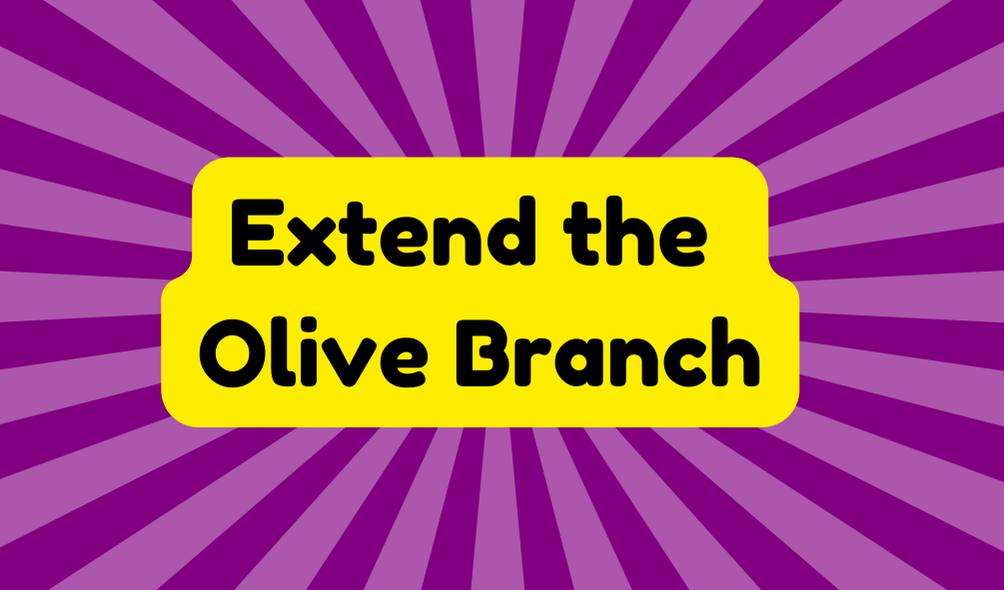To "extend the olive branch" means to offer a gesture of goodwill aimed at reconciliation. This phrase has roots in ancient traditions and symbolizes a desire for peace. While it sounds noble, the effectiveness of this gesture often depends on the sincerity behind it. In today's polarized society, such gestures are essential for resolving conflicts, whether personal or political. However, skepticism remains regarding their actual impact; not all attempts at reconciliation yield results. Understanding the complexities of conflict resolution can enhance the likelihood of success. If you're curious about practical examples and further implications, there's more to explore.
Synonyms
In the context of peace offerings and reconciliation, several synonyms capture the essence of "extending the olive branch." Terms such as "gesture of goodwill," "peace offering," "reconciliation attempt," and "diplomatic overture" effectively convey similar meanings. These concepts are fundamental to effective reconciliation strategies and can illuminate the often complex dynamics of interpersonal and international relations.
- Gesture of goodwill enhances mutual understanding.
- Peace offering showcases willingness to compromise.
- Reconciliation attempt signifies proactive conflict resolution.
- Diplomatic overture lays groundwork for future dialogue.
While these terms can inspire hope, it is crucial to approach them with a critical lens. Often, such gestures may mask underlying tensions that need addressing for genuine peace initiatives to succeed. Clear communication remains imperative in establishing lasting harmony.
Example of Sentences
Examples of effective communication often involve extending the olive branch in various contexts, highlighting the importance of reconciliation. Such gestures serve as critical tools for conflict resolution, enabling individuals and groups to engage in peaceful negotiations. Here are examples illustrating this concept:
- John decided to extend the olive branch and contact his friend to mend their relationship.
- The new president offered an olive branch to neighboring countries to improve diplomatic relations.
- During negotiations, both sides took turns offering the olive branch to reach a compromise.
- Billy extended an olive branch to his sister on her birthday to resolve their earlier conflict.
These sentences underscore the need for empathy and proactive engagement, showing that extending the olive branch can lead to meaningful dialogue and resolution in strained relationships.
Origin
The origin of the phrase "extend the olive branch" is steeped in ancient history, embodying the timeless pursuit of peace and reconciliation. This expression traces back to the sacred olive tree, revered in Greek mythology, symbolizing prosperity and harmony. In Roman traditions, olive branches were integral to peace rituals, often exchanged during negotiations between adversaries. The biblical account in Genesis 8:11, featuring a dove returning to Noah with an olive leaf, highlights the ancient symbolism of renewal after turmoil. While this phrase has gained modern acclaim, it's essential to critically evaluate its effectiveness in actual diplomatic efforts. Ultimately, the olive branch serves as both a powerful metaphor and a reminder of the ongoing challenges we face in achieving genuine peace.
Collocations
Various collocations associated with "extend the olive branch" reflect its nuanced applications across different contexts. These terms highlight how this expression plays a critical role in conflict resolution and peace negotiations, serving as a bridge between opposing parties. Understanding these collocations can help clarify the intention behind such gestures, revealing deeper layers of meaning.
- Extend an olive branch to signify reconciliation.
- Make an olive branch gesture during peace talks.
- Offer an olive branch to facilitate dialogue.
- Accept an olive branch to restore relationships.
Recognizing these associations encourages a more discerning approach to interpersonal and international relations. While extending an olive branch is an admirable act, it should not overshadow the complexities involved in genuinely resolving conflicts and achieving lasting peace.
How to Use in Everyday Language
Although extending the olive branch is often associated with formal negotiations and diplomacy, it can also be effectively integrated into everyday conversations. In personal relationships, using this phrase can signify one's commitment to conflict resolution, inviting a more conciliatory tone. For instance, one might say, "I want to extend the olive branch and clear the air after our disagreement." This fosters an environment where peace negotiations are possible. Similarly, in the workplace, suggesting an olive branch approach encourages open dialogue among colleagues who may be at odds. However, caution is advised; it is crucial to guarantee sincerity in such gestures, as insincerity can undermine efforts and lead to further conflict rather than resolution.
Why Is It Still Relevant Today?
Extending the olive branch remains relevant in contemporary society due to its profound implications for conflict resolution in both personal and political domains. As we navigate increasing polarization, the need for reconciliation is paramount. Offering gestures of goodwill can initiate peace initiatives, fostering dialogue over discord. Yet, skepticism arises—do these gestures lead to tangible outcomes, or are they merely symbolic acts? While extending an olive branch embodies hope, its effectiveness often hinges on the sincerity behind it. In personal relationships, it signifies a genuine desire to reconnect, while in politics, it can indicate meaningful compromise. Ultimately, the act of extending an olive branch serves as an essential step towards healing, reminding us of the ongoing necessity for understanding and collaboration in an increasingly divided world.







